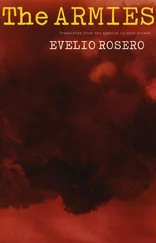“He’s got it coming to him.”
Enrique Quiroz, chief instigator of the action against Doctor Proceso, had spoken.
“That doctor is boss and ringleader for the idiot Chivo. Both of them are barmier than billy goats, but poisonous ones.”
The church bell tolled ten o’clock, ringing for morning Mass. Three of the group members gave an account of their military action:
“Yesterday we managed to seize two sculptures from that sell-out Cangrejito, the black piece of shit, artist of the enemy.”
“They’re wooden. Huge.”
“The shooting of the twenty Capuchin missionaries of Caroní, on Bolívar’s orders.”
“And of the La Guaira eight hundred, on Bolívar’s orders.”
“The captions were: Bolívar shoots the twenty Capuchin friars, 1817 and Bolívar shoots the La Guaira eight hundred, 1814, with dates and everything. Some balls, those bastards.”
“They looked very nice, really well made, for what it’s worth. In the one of the twenty Capuchins there was a Bolívar figure on horseback; a soldier was telling him about the capture of the twenty friars; Bolívar was asking, in wooden lettering: And you haven’t killed them yet? In the one about the eight hundred there were some old folk tied to their chairs, and that’s how they were carried and put up against the wall, because they couldn’t walk anymore. How about that? The captions also said: Gunpowder was expensive so they used sabres and pikes and The executions began on February 13 and finished on 16 . Where did they get that from, those oafs?”
“What is to be done with history?” Puelles asked. “We don’t know who these people were, or who they were not either.”
“We didn’t know about these executions, at least. Did you?”
There was a silence, sharp as a guillotine, that Enrique Quiroz rushed to diffuse.
“If Bolívar shot them or used sabres or pikes on them, it was because they deserved it,” he said. “Bolívar cannot be called into question.”
“Those planks burned well on the bonfire we made.”
“Was that big black guy there, in the workshop? Did he put up a fight again?”
“He’d gone out. His apprentices were there, a bunch of yobs.”
“Watch what you say,” Quiroz said. “The apprentices are the people. Workers and campesinos add up to the future of the revolution. In this particular case, ignorance makes them innocent.”
“Perhaps the black guy hasn’t come back; he saw the way the wind was blowing. He took most of his work with him: he wants to show it all together on the float. That’s what he thinks.”
“Shitty reactionary. We’re going to blow his carriage sky high, along with everyone putting it together.”
“We don’t know where he went,” the apprentices told the doctor. “He disappeared in secret.”
They were in Cangrejito’s studio, empty of work. Despite it being mid-day, it seemed like night-time in there. There were three apprentices, big simple lads, propped against the walls, having their lunch of steamed corn parcels and cold oat milk.
“He took his sculptures with him yesterday, Friday, in a truck: imagine a truck full of carnival. And the thieves came last night; they didn’t find anything; they could only take two ‘Executions,’ which Cangrejito left behind because he hadn’t finished them.”
They did not seem frightened to the doctor, more like intrigued.
“They swore they’d give us a pounding if we carried on with the carriage,” the oldest apprentice said, chubby and smiling. “They were armed, that’s how they got away with stealing what they stole, they didn’t look very tough.”
“Police or military?”
“They were masked up, Doctor. I don’t think they were soldiers. You could see their hair, lots of it, underneath. Long-haired guys. They were just robbers, that’s all, and scared.”
The doctor was disconcerted. He could not imagine who they were up against. Was General Aipe behind all this? Now he doubted it.
“They said,” added another apprentice, fair, almost albino, “that in any case they were going to boot us all up in the air, one by one.”
“Like we were lying around to start with,” the fat one said, laughing. But the fair boy spoke again, very grave:
“They especially mentioned you, Doctor. They said: ‘We’re going to boot that so-and-so sky high.’”
“As if I were lying around too,” the doctor said.
“And if you carry on being a nuisance, they will shoot you, not boot you, Doctor.”
The fat boy burst out laughing; only then did the rest join in.
“Lucky none of us is lying around,” the doctor said in parting.
He drove through the muddy streets, unable to guess Cangrejito Arbeláez’s destination. The midday chill dampened his spirits. Who was he fighting against? Was it possible the mayor and bishop’s warnings would come true? He was worried about the sculptor’s fate — where would he have gone? Maestro Abril was the only person who could bring him up to date with events.
The secret poet Rodolfo Puelles was not convinced by the direction things were heading in. He had, above all within himself, serious reasons for this — or, better put, one single and terrible reason, although he admitted, inwardly, that things had begun with the best of intentions. But why, he yelled inside, are we messing them up?
Two years earlier, the group’s founding members had participated in one of Colombia’s historic student marches, which brought together more than five hundred thousand citizens in the capital. It was during this encounter that the group gained in numbers and enthusiasm: one of its members had even been given a grant by Fidel Castro’s government and travelled to Cuba to complete his studies. He sent passionate and inspiring letters from the island, which were seen by the group as triumphant war reports. When the student wrote that he was to go to Russia to specialize, and in addition receive political training, maybe military, the group was divided: some argued the student should return to Colombia immediately to take up the struggle again and occupy the position allotted to him, while others felt his sojourn in Russia was an “essential” experience, which would be to everyone’s advantage. So the hours had flown past until the early morning, and the wasting of energy on similar controversies, and other even more trivial matters (should you read or not read Count Leo Tolstoy: decadent writer, retrograde, symbol of Russian aristocracy?), undermined the poet’s morale, all the more so when the “polemic” about Tolstoy originated not from a sensible study of his work, but in a chance occurrence: the book had fallen out of his knapsack onto the table, and in spite of the covers being carefully wrapped in newsprint, the paper came adrift and title and author appeared before them all: The Devil, Leo Tolstoy. Enrique Quiroz picked up the book, showed it around as if showing them the actual devil, and did so with a disparaging smile, the same one spreading across the others’ faces: incredulous eyes scrutinized the poet Puelles as if they would unmask him. What was he up to, this Puelles, who was he, really? Puelles prepared himself for the fight, more apathetic than resolved: he gave up before he started — and with all the more reason, he thought, when Tolstoy was the namesake of the dissident Trotsky.
Was it so important to finish your degree, or better to take up arms, go into the mountains and educate the rural masses?
The recent death of Father Camilo Torres — founder of the sociology faculty at the National University, principal representative of liberation theology, leader of the people — which took place in February 1966, when he was cut down during his first combat, had been the trigger for Enrique Quiroz’s group to seriously consider the creation of an urban guerrilla front. The poet Puelles backed the initiative: he would prefer to fight in the city (he could not imagine himself firing a gun in the depths of the jungle), finish his degree and, above all, pursue his secret occupation, poetry, his poetry, the humorous love that sprang from his pores, as he put it. That is why he devoted himself to supporting the urban front and making it a reality. Up to that point, everything had gone well for Rodolfo Puelles, but formulating urban guerrilla war in Bogotá, with the Quiroz brothers plus three others from the Pasto front, and four from the capital, got off to an unanticipated start.
Читать дальше












